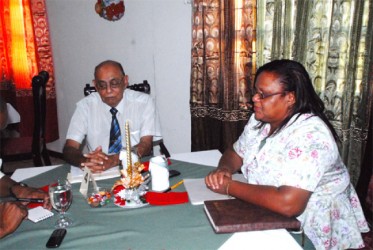Stabroek Business has learnt that the 80-year-old Carnegie School of Home Economics (CSHE) is set to undergo a major makeover that will result in its transformation into Guyana’s first ever hospitality institute, possibly within the next three years.
During an interview on Tuesday, Chairman of the school’s Board of Directors John Seeram and its Principal Penelope Harris told this newspaper that plans are already being conceptualised to implement a recommendation contained in a study undertaken by the Caribbean Development Bank (CDB) in 2012 to transform the institution into a training facility that will more adequately respond to the needs of the sectors which it serves.
Stabroek Business understands that the transformation exercise envisages the re-siting of the institution from its present D’Urban and High streets location. The new site will see the creation of a modern campus capable of delivering a significantly enhanced curriculum that will meet the multi-faceted training needs of the local tourism and hospitality, food and beverage, craft, culinary and other key service sectors.

Carnegie officials declined to disclose the full details of the recommendations contained in the CDB study. However, the chairman told Stabroek Business that apart from the re-siting of the facility to a better-appointed campus, plans include a comprehensive review of its curriculum and the recruitment of a cadre of trainers to deliver the curriculum.
Asked about the likely challenges associated with recruiting staff to serve a hospitality institute, Harris said this would involve looking for recruits in new areas. The CSHE, which currently falls under the administrative control of the Ministry of Education, is being supported by private sector operatives through hands-on training at their places of business. Harris said such exercises help the CSHE to evaluate the progress being made by its students in a practical setting.
The CSHE also runs its own training restaurant at its D’Urban and High streets complex.
Harris said that while the CSHE was continuing to function in its customary role, much thought was currently being given to the challenge of transforming the institution.
She said one of her concerns was with the role Guyanese in the Diaspora, including former students, could play in supporting the transformation of the institution.
Harris said Guyanese living abroad may feel moved to make various types of contributions because of the good work the CSHE has done over the years.
Meanwhile, Seeram, a former UWI tutor who is in his fifth year as CSHE Board Chairman, told Stabroek Business that the plan for the transformation would require the support of both the public and private sectors.
He said that apart from technical support, the initiative to transform the CSHE into a hospitality institute would require significant investment in equipment.
Seeram said a development plan for the creation of the institute had been prepared and is to be put before the board.
An accompanying financial plan is to be prepared, he said, adding that funding the project could require the support of multilateral financial organisations.
Meanwhile, the school’s principal told Stabroek Business that she expected the creation of the hospitality institute would materialise in a phased way, over what she envisaged would be “a three-year period”.
She said that while the CSHE had originally been established “to create jobs”, its role had continually transitioned over the years, to take account of training and, in the contemporary era, to meet the increased needs of the country’s tourism and hospitality sectors.
The CSHE currently provides training in various disciplines for around 1,200 persons annually, targeting both full-time and part-time students. Harris said the school accommodates around 250 students at any one time with around 100 graduating in any one year.
However, the growing demand for the services provided by the CSHE arising out of the needs of hotels, restaurants, snackettes as well as the requirements of public sector institutions had meant that the need to separate the academic responsibilities of the school from the practical services which it provides, had to become more streamlined.




